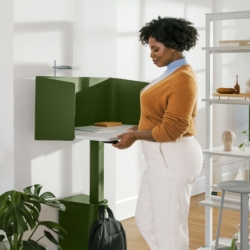To provide the best experiences, we use technologies like cookies to store and/or access device information. Consenting to these technologies will allow us to process data such as browsing behaviour or unique IDs on this site. Not consenting or withdrawing consent, may adversely affect certain features and functions.
The technical storage or access is strictly necessary for the legitimate purpose of enabling the use of a specific service explicitly requested by the subscriber or user, or for the sole purpose of carrying out the transmission of a communication over an electronic communications network.
The technical storage or access is necessary for the legitimate purpose of storing preferences that are not requested by the subscriber or user.
The technical storage or access that is used exclusively for statistical purposes.
The technical storage or access that is used exclusively for anonymous statistical purposes. Without a subpoena, voluntary compliance on the part of your Internet Service Provider, or additional records from a third party, information stored or retrieved for this purpose alone cannot usually be used to identify you.
The technical storage or access is required to create user profiles to send advertising, or to track the user on a website or across several websites for similar marketing purposes.
 The State of the Global Workplace: 2025 Report from Gallup frames a stark warning to business leaders and policymakers: people around the world are becoming increasingly disengaged from work at a time when technological change is demanding more from them than ever before. As artificial intelligence (AI) accelerates across industries, transforming everything from operations to communication, the human foundations of the workplace—employee engagement and wellbeing—are showing signs of deep strain. (more…)
The State of the Global Workplace: 2025 Report from Gallup frames a stark warning to business leaders and policymakers: people around the world are becoming increasingly disengaged from work at a time when technological change is demanding more from them than ever before. As artificial intelligence (AI) accelerates across industries, transforming everything from operations to communication, the human foundations of the workplace—employee engagement and wellbeing—are showing signs of deep strain. (more…)
















 This year’s London Real Estate Forum (LREF), held from 27-28 September at the Barbican, had a general air of optimism but tempered with the uncertainty of a general election in the next twelve months and elements of political and economic uncertainty globally. The day began with a state of the market discussion chaired by dRMM’s Sadie Morgan, with challenges facing the industry identified as the current valuation of the office market, the rate of housebuilding and the government’s lack of investment in infrastructure – the event coinciding with the furore over the cancelling of the northern part of HS2.
This year’s London Real Estate Forum (LREF), held from 27-28 September at the Barbican, had a general air of optimism but tempered with the uncertainty of a general election in the next twelve months and elements of political and economic uncertainty globally. The day began with a state of the market discussion chaired by dRMM’s Sadie Morgan, with challenges facing the industry identified as the current valuation of the office market, the rate of housebuilding and the government’s lack of investment in infrastructure – the event coinciding with the furore over the cancelling of the northern part of HS2. 













April 30, 2025
Co-working spaces bring a whole range of benefits for employees and communities
by Mariachiara Barzotto • Comment, Flexible working, Property, Workplace design